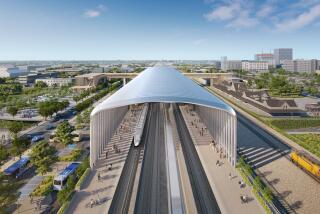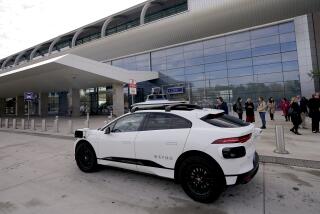Foothill Transit Gets Green Light to Operate Despite RTD
- Share via
For the last year, backers of the fledgling Foothill Transit Zone have contended with various legal and political roadblocks, including a trial over whether it could even exist.
The hurdles have hampered the agency’s plans to take over more than a third of the San Gabriel Valley’s bus service from the Southern California Rapid Transit District.
But this week, Foothill Transit may have escaped its most serious threat when a Los Angeles Superior Court judge upheld its right to operate, surmounting a challenge by RTD drivers and mechanics.
“There is a tomorrow,” said William P. Forsythe, Foothill Transit executive vice president. The decision “is going to allow us to do what we set out to do a long time ago--provide a transit option for people out here instead of driving a car.”
Los Angeles Superior Court Judge Eli Chernow on Tuesday upheld Foothill Transit’s continued operation, which includes its plans to take over up to 20 of RTD’s 54 lines in the Foothill area by the middle of next year. Foothill Transit, a partnership among 20 area cities and the county, contracts with private bus companies to provide service.
“It’s a clear victory for all the people of the San Gabriel Valley,” said Claremont Councilwoman Judy Wright, who is president of the transit zone and a frequent critic of the RTD’s San Gabriel Valley service. “I’ve been working on this for 13 years . . . so I feel this is a culmination of that work.”
During the monthlong trial that ended in June, union attorneys contended that Foothill Transit threatened union jobs at RTD and was an illegal, “privatized” competitor. Representatives of the United Transportation Union, which represents drivers, and the Amalgamated Transit Union, which represents mechanics, charged that Foothill was an attempt to bust the unions. Foothill officials deny that.
Calls Much of the Case Political
In his ruling, Chernow said much of the case was political and not under the court’s jurisdiction. He ruled that Foothill was legally created and that the potential harm to the area’s bus riders if Foothill were not allowed to take over the lines outweighed the possible adverse impact on RTD workers.
Chernow’s decision gives the unions 15 days to appeal. Neither union representatives nor their attorneys could be reached about whether they will do so.
“We will go forward and do whatever we have to do, and if an appeal is part of it, then we’ll be there,” Wright said. “But I’m hoping that the decision is strong enough to prevent that.”
Foothill’s vice president, Robert Bartlett, was blunter: “When the decision comes out so clearly one way or another, appeals tend not to look so bright.”
Since December, Foothill has contracted with Embree Bus Lines to operate two freeway express routes from Diamond Bar and Glendora to downtown Los Angeles.
Foothill Transit’s base fare is 85 cents, compared to the RTD’s base fare of $1.10. Forsythe has estimated that ridership has increased up to 20% on the lines since Foothill took them over. There now are more than 2,660 riders on the Foothill lines each day, he said.
Foothill plans to add five local lines in the mid-San Gabriel Valley area in August, bringing to seven the number of routes taken over from the RTD.
Forsythe said Foothill is negotiating with Cincinnati-based ATE Inc. to operate the lines.
Foothill, having ordered 60 new buses, intends to take over two additional express lines in late January from the Pomona Valley to Los Angeles.
Foothill Transit was approved by the county Transportation Commission, which oversees county transportation policy, in late 1987 as a low-cost alternative to the RTD. The effort was spearheaded by county Supervisor Pete Schabarum, a strident RTD critic, who charged that the area suffered from inadequate service and a disproportionate number of RTD cutbacks.
Unions Won Temporary Injunction
Nevertheless, its start-up was stalled in June of last year when Chernow granted the unions a temporary injunction until the RTD consented to Foothill’s taking over lines.
In the six months that followed, the Transportation Commission withheld more than $9 million a month from the RTD’s budget. In return for the money, the RTD board consented in December to Foothill’s operating. At the time, Schabarum was commission chairman.
But the threat of a permanent injunction, which could have killed the zone, remained until Tuesday.
More to Read
Sign up for Essential California
The most important California stories and recommendations in your inbox every morning.
You may occasionally receive promotional content from the Los Angeles Times.













